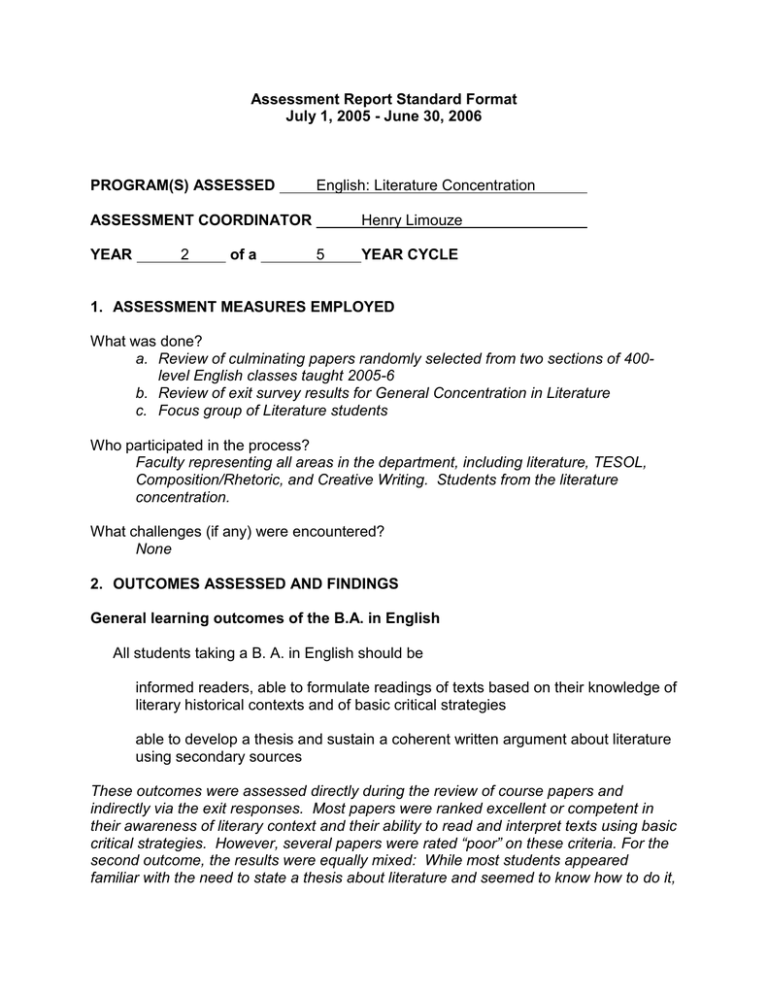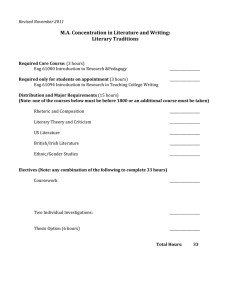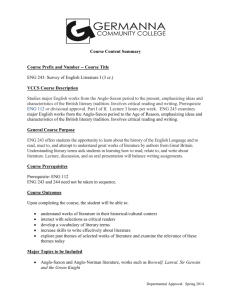Assessment Report Standard Format July 1, 2005 - June 30, 2006
advertisement

Assessment Report Standard Format July 1, 2005 - June 30, 2006 PROGRAM(S) ASSESSED English: Literature Concentration ASSESSMENT COORDINATOR YEAR 2 of a Henry Limouze 5 YEAR CYCLE 1. ASSESSMENT MEASURES EMPLOYED What was done? a. Review of culminating papers randomly selected from two sections of 400level English classes taught 2005-6 b. Review of exit survey results for General Concentration in Literature c. Focus group of Literature students Who participated in the process? Faculty representing all areas in the department, including literature, TESOL, Composition/Rhetoric, and Creative Writing. Students from the literature concentration. What challenges (if any) were encountered? None 2. OUTCOMES ASSESSED AND FINDINGS General learning outcomes of the B.A. in English All students taking a B. A. in English should be informed readers, able to formulate readings of texts based on their knowledge of literary historical contexts and of basic critical strategies able to develop a thesis and sustain a coherent written argument about literature using secondary sources These outcomes were assessed directly during the review of course papers and indirectly via the exit responses. Most papers were ranked excellent or competent in their awareness of literary context and their ability to read and interpret texts using basic critical strategies. However, several papers were rated “poor” on these criteria. For the second outcome, the results were equally mixed: While most students appeared familiar with the need to state a thesis about literature and seemed to know how to do it, many were judged “competent” (rather than excellent) in their ability to develop a coherent argument about literature. The reviewers also noted problems in grammar, mechanics, and spelling on some of the papers. On the exit surveys, most students commented very positively about the department’s courses. Learning outcomes of the concentration in Literature Students in the Literature Concentration should also be familiar with works in the Anglo-American literary tradition and other literatures written in English familiar with and able to use the terms of literary analysis All concentrations within the English major require students to take a similar core sequence of literature courses so the general outcomes for the major and the specific outcomes for the literature concentration overlap a good deal. The faculty review group discussed this question. Faculty feel that the desired outcomes for the literature concentration ask for a deeper understanding of literary history and of English and American literatures than do the general outcomes for the major. Further, faculty feel that the requirement of using "the terms of literary analysis" represent an important step towards critical and theoretical self-awareness, beyond the simple ability to develop and sustain a coherent argument, expected of all students in the English major. However, students from all concentrations will appear in every 400-level literature course, and students do not self-declare their concentration in class or on an assignment. Therefore, it is impossible to expect this higher degree of sophistication of all papers randomly selected for review. With this problem clarified, faculty found that a very reasonable number of papers in the 400-level classes did meet most of the expectations ("excellent" or "competent") stated above. For example, one of the courses for which papers were reviewed covered early Modern British literature unfamiliar to most students. Yet most of the papers from this class were able accurately to relate the literature they were discussing to historical context, either by discussing the literature in light of a literary tradition or by placing it in a valid religious, philosophical, historical, or social context. Fewer of the papers reviewed exhibited the critical and theoretical self-awareness asked for by the second outcome, but there were some impressive and interesting applications of feminism and of other theories. However, the faculty reviewers also noted an apparent bipolarity. While a reasonable number of the papers were at least competent in meeting these higher standards of understanding and ability, an alarming minority appeared to show little awareness of even the basic goals of a literature paper. Most of these same papers showed no awareness of MLA citation methods and in any case handled secondary sources poorly. Faculty reviewers discussed this minority at great length. We have no way of being sure, but it appeared to the reviewers that the students who had written these papers had not completed our core Introduction to the Study of Literature sequence, ENG 300 and 301, which are prerequisites for all 400-level literature courses. This hunch is underscored by the anecdotal report of faculty and advisors. While we remind students regularly that they must not take any 400-level literature course until they have completed ENG 300 and 301, we are quite aware that they ignore this advice. Faculty report that students who take these courses out of sequence generally do quite poorly in the advanced classes (but not always). One or two students in the focus group also reinforced this point in their comments. They felt that sometimes our 400-level literature courses were somewhat "watered down" because faculty were trying to meet the needs of unprepared students while trying to teach advanced material. They wondered why such unprepared students were even admitted to senior-level literature classes. 3. PROGRAM IMPROVEMENTS Faculty recommended two areas for improvement and discussed a possible third. a. Echoing an earlier recommendation made in a 1990s assessment, faculty continue to feel students should have the opportunity to take courses in critical theory, critical approaches to literature, and other courses informed by theoretical thinking. The department infrequently offers undergraduate courses in critical theory (using the 450 number) but does frequently offer courses on literature and gender, literature and ethnicity, and post-colonial literature, courses which are typically informed by theory. As new literature faculty join the department we will continue to increase the number of such offerings. b. It has been impossible to enforce prerequisites under previous systems in place. The new Banner system appears to be able to permit the department to enforce the prerequisite that students take ENG 301 before registering for a 400-level literature course. Faculty unanimously wish this to remain on the books as a "hard" prerequisite. Faculty hope that this prerequisite feature will be turned on very soon. c. A third area discussed was the requirement that students must have a C or better in ENG 300 to enter ENG 301, and that students must have a C or better in ENG 301 to register for a 400-level literature course. Since the university cannot now enforce any prerequisites, it seemed premature to us to recommend this action. However, if student performance does not improve once prerequisite enforcement is in place, we may wish to return to a recommendation of this kind. 4. ASSESSMENT PLAN COMPLIANCE Explain deviations from the plan (if any). None 5. NEW ASSESSMENT DEVELOPMENTS Describe developments (if any) regarding assessment measures, communication, faculty or staff involvement, benchmarking, or other assessment variables. Faculty will continue to monitor student performance in their upper-level literature courses once the prerequisite requirements of ENG 300 and 301 have been made effective.




